|
 |
 |
|
|
|
 |
Memories of the first meeting
COLLOQUIUM ON PHOTOCOAGULATION in Lausanne 14-17 Sept. 1959
Dear Colleagues !
I hope that among the members of Club Jules Gonin participating now there are some colleagues, who were there on the first meeting in Lausanne. I recall my memories with this hope in mind, and in remembrance with respect to the pioneers who stepped onto a brand new road, which over in 50 years drove the retina surgery up to the present level.
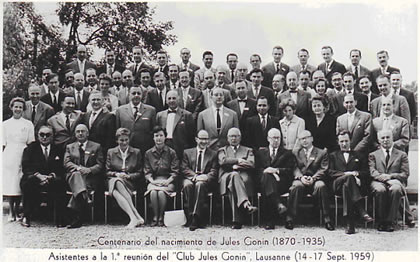
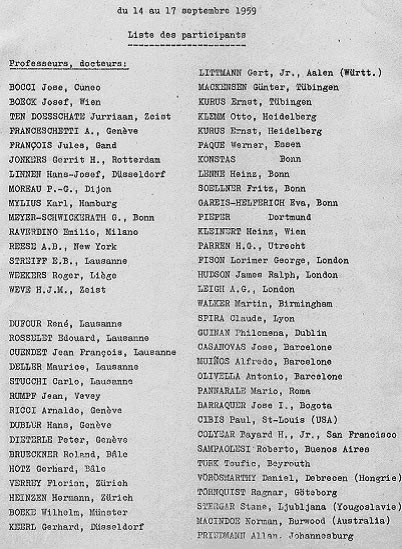
The first step of this road was photocoagulation, the recognition of the opportunity that it is possible to transmit light into the inside of the eye through the optical medium of the eye with an intensity necessary for the protein coagulation. For this at that time we had two possibilities: artificial light, which was arc-light and xenon, and the natural sunlight.
Meyer-Schwickerath was the pioneer with his Xenon- Photocoagulator made by Zeiss-Company with which he performed completed successful photocoagulations, till then unknown on the eyelid, on the anterior segment, and on the fundus.
Prof. Meyer-Schwickerath invited me to the meeting in Lausanne to present my sunlight photo coagulator, with which I preformed irido- and capsulotomies, and the photocoagulation of a choroidal melanoma.
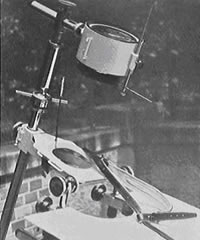 |
 |
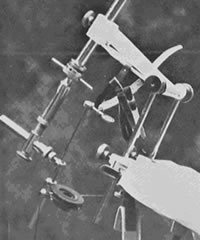 |
Sunlight photo coagulator
|
Iris |
| Iridotomy
|
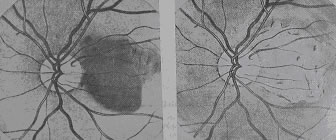 |
Choroidal melanoma |
Being a young doctor, it was my first travel, which proved to be determining for me. I participated at the session on the newest results defining the new guidelines of retina surgery.
My travel was not a curiosity for myself only. I came from behind the "iron curtain", from Hungary, at a time when hardly anybody had the opportunity to travel. My tutor, Prof. Dr. Aladár Kettesy communicated to Gerd Meyer-Schwickerath that I could not take any currency apart from Hungarian Forint, which meant that I could not even purchase a railway ticket. As an answer to this problem I received a ticket from the management of the colloquium to the Balt-Orient Express.
Eventually the Health Ministry of Hungary granted me permission to travel for a scientific purpose and allowed me to buy 5 dollars at the Hungarian National Bank.
I got on the train on Budapest, the 5 dollars in my pocket, because I was not allowed to take more money. I experienced the first surprise in Vienna.
It was necessary to book a seat there. I did not know what it was, only that it costs more than 5 dollars. Fortunately a kind man with Hungarian ancestry understood my hopeless situation, handed over his reserved seat ticket, which was valid for the Express, and then took a walk. The conductor checked my tickets and was satisfied. The kind man appeared later, took his place and afterwards it was my turn to walk.
I arrived to Lausanne around midnight, and I wanted to go to the ophthalmic hospital. I really thought that the accommodation would be there in empty patient rooms, just like at home in Hungary. Many eye-specialists were not able to pay the hotel bill at that time.
I was thus not troubled by the fact that I had 5 dollars only.
It turned out later that it was not enough even for the taxi drive.
I saw a policeman on the station. When he discovered that I am from Hungary, just like our football-star "Puskás Öcsi", he ordered a cab immediately and took me to the ophthalmic hospital.
They greeted me there surprised as they did not understand why I would like to sleep there, since I was a doctor and not a patient. In the end, however, I was given a separate, marvelously furnished room.
Next morning Prof. Meyer-Schwickerath, Prof. Dufour and Prof. Streiff, the clinic's headmaster came to visit me, all being surprised slightly, and with extraordinary benevolence they tried to persuade me to move to a hotel as it would be more comfortable than the clinic. It was communicated that the management of the colloquium pays the hotel expense. I tried to refuse it, but finally they convinced me that the clinic's private room was much more expensive than the most distinguished hotel. My behavior must have surprised them, but they politely did not show it.
At the end of the colloquium Dr. Jean Rumpf, a colleague from Vevey invited me to stay with him for 2 weeks. Upon the request of the Colloquium's chairman the Hungarian Embassy extended my travel permit. I was afraid to ask for this personally, I was concerned that they could arrest me!
Once having obtained the permit, there came the opportunity to look around in the most independent and free country.
Even after fifty years I feel how warmly the Swiss colleagues received me, and how different it was to live on the other side of the iron curtain. We could hardly understand each other.
It was in Lausanne that I first feel what it was to be a free man, and how humiliating it is to live behind the iron curtain. Today, and we thank God for this, Hungary is free, which I did not dare to dream about then.
It was also in Lausanne that I realized what power there is in knowledge; men of science can rise above political opposition and violence, and are stronger without weapons than the mightiest army.
This incredible potential is reflected in the unbelievable development we have witnessed in the last 50 years. It is a good example to think about the LASER technology or the instruments we use today and what we used 50 years ago.
This last sentence is not part of the memoire, but the scope of the present, which the imminent meeting will be about. For that, I wish great success, fruitful conversations and an intimate mood, just like in 1959.
Sincerely Yours: Prof. Dr. Daniel Vörösmarthy
|
|
 |
|
 |
| |